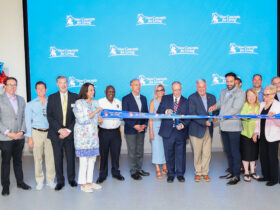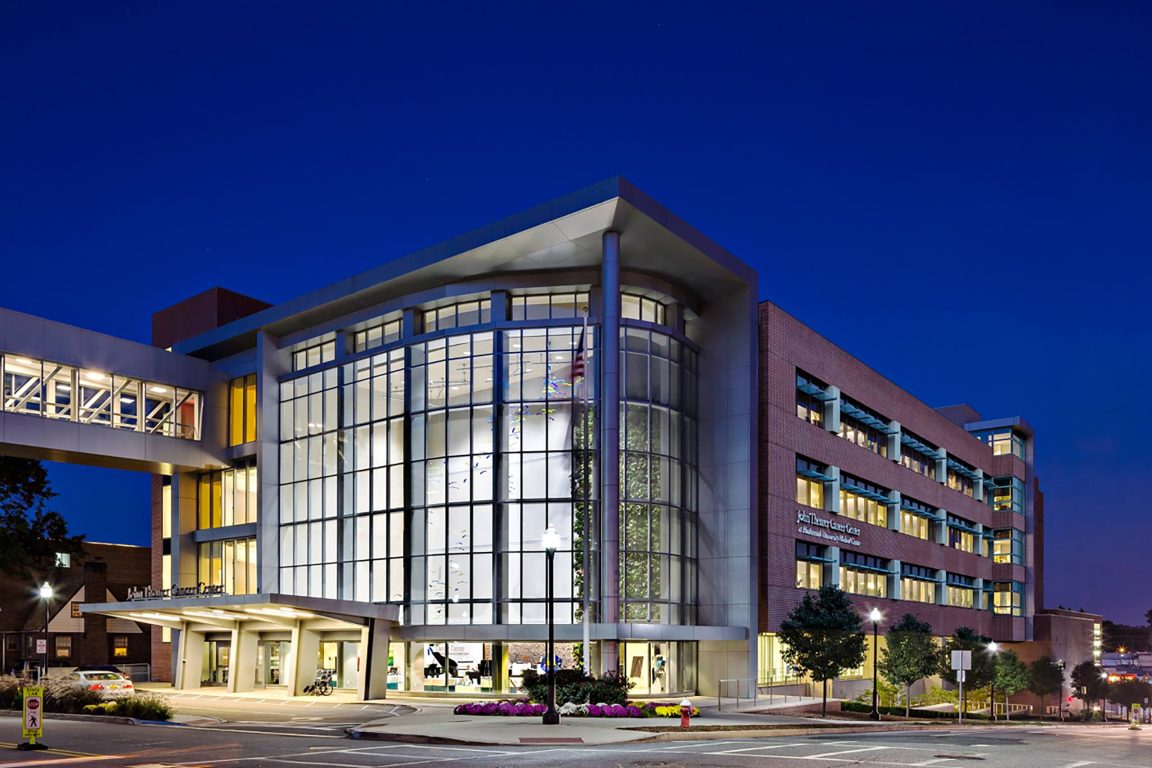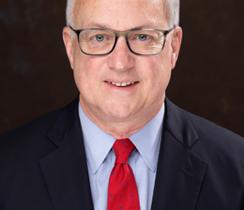The John Theurer Cancer Center at Hackensack Meridian Health (HMH) was again recognized as a research consortium partner of the Georgetown University Lombardi Comprehensive Cancer Center.
The designation was handed down by the National Cancer Institute (NCI), a division of the National Institutes of Health (NIH). The oncology collaboration between HMH and Georgetown aims for greater patient access to innovative clinical trials.
It is seen as a significant step towards the future goal of developing a clinical, translational and basic science cancer research consortium, according to statements by HMH and Georgetown University.
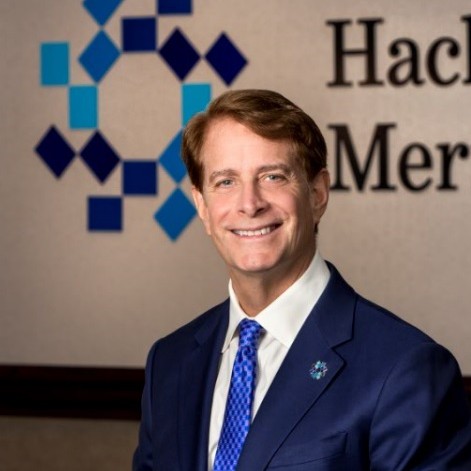
“This grant is a testament to our shared commitment to discover innovations that change our understanding of cancer and ultimately, lead to the best care possible,” said HMH CEO Robert C. Garrett, FACHE.
“Our extraordinary teams are delivering tomorrow’s cures today and transforming health care. We are honored to lead research that benefits residents across the state of New Jersey and partner with Georgetown Lombardi as part of this tremendous Comprehensive Cancer Consortium,” Garrett added.
A Few Acronyms Serve 6.5M+ People
More than 6.5 million people live in the areas served by both cancer centers in Hackensack, New Jersey and Washington, D.C. The resulting consortium from both intends to amplify the work of both cancer centers.
Georgetown Lombardi is part of Georgetown University Medical Center and is the research engine for MedStar Health, Georgetown’s clinical partner. It also has a consortium with Hackensack Meridian John Theurer Cancer Center in Bergen County, New Jersey.
The “comprehensive cancer center” designation handed down to Georgetown’s cancer center by the NCI’s NIH is through a competitive, peer-reviewed process. The designation process recognizes the center’s research, community outreach, and cancer care. Georgetown Lombardi is the only center in the Washington, D.C. area to receive this designation.

“Since 1970, Georgetown Lombardi has epitomized excellence in cancer research,” said Georgetown University President John J. DeGioia.
“Our clinicians and researchers have seamlessly integrated high-impact research, community outreach, and patient-centered cancer care to advance our understanding of cancer prevention, treatment, and cures,” he added.
The “Comprehensive Cancer Center” Designation
First awarded in 1974, the “Comprehensive Cancer Center” recognition is the highest honor the NCI can give. Only 51 of the 1,500 cancer programs in the U.S. have received it, according to a statement from NCI.
The NCI designation is a competitive award given to centers that meet strict criteria for research, clinical care, education, and prevention.
Only 4% of cancer centers receive the NCI designation, and only 56 have the status of comprehensive cancer center.
HUMC and Georgetown Lombardi
Georgetown Lombardi was first designated as a comprehensive cancer center 50 years ago through the NCI’s cancer center support grant program.
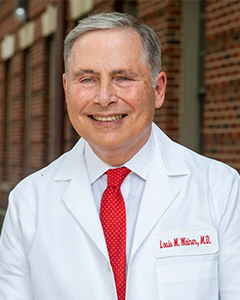
“This highly coveted grant requires considerable virtuosity in laboratory and translational research, clinical research, population science research, community outreach and engagement, and in training the next generation of cancer researchers and clinicians,” says Louis M. Weiner, MD, director of the Georgetown Lombardi Comprehensive Cancer Center.
“Our impact is ultimately determined by how well we address the cancer needs of our medically underserved neighbors,” says Weiner. He notes the 60% reduction in cancer deaths in the DC region over the past 20 years due to many factors and helped by the presence of a comprehensive cancer center in the community.
To help amplify the benefits of improved treatments, Weiner says the cancer center, along with its consortium partner, John Theurer, has exponentially expanded its community outreach and education efforts.
“In fact, in the last five years, despite the isolating impact of the COVID-19 pandemic, more than 34,000 people have participated in our community events,” Weiner says.
Georgetown Lombardi’s journey towards comprehensive cancer center status began in 1971 with the establishment of the NCI’s cancer centers program. Over the past five decades, the center has evolved into a hub of excellence in laboratory research, clinical trials, population science, community engagement, and training for future cancer researchers and clinicians.
Georgetown Lombardi’s comprehensive cancer center status extends beyond academic accolades; it directly impacts cancer patients in Washington, DC, and New Jersey. Through partnerships with MedStar Health and Hackensack Meridian Health, patients gain access to cutting-edge therapies, clinical trials, and tailored support services.
Additionally, Georgetown Lombardi prioritizes outreach to underserved communities, particularly in Washington’s wards 6, 7, and 8, and across New Jersey. The Ralph Lauren Center for Cancer Prevention, established in 2023, spearheads community education, screenings, and navigation services, addressing critical gaps in cancer prevention and care.
Advancing Cancer Research
Looking ahead, Georgetown Lombardi remains focused on advancing cancer research, exploring new treatments like immunotherapy and cell therapies, and enhancing survivorship programs. With a renewed commitment to excellence, the center aims to continue its impact on cancer care and outcomes for years to come.
The NCI is the largest of the NIH’s 19 institutes and 7 centers. The NCI’s mission is to lead the country’s research efforts to improve cancer prevention, detection, diagnosis, and survivorship.
The National Cancer Act
The National Cancer Act was signed in 1971, establishing the NCI’s cancer centers program. In 1974, Georgetown Lombardi received its first comprehensive cancer center designation. Fifty years later, in the spring of 2023, the cancer center submitted its latest renewal, leading to a daylong site visit by a committee of “peers” on Sept. 12. The committee recommended continued NCI designation as a Comprehensive Cancer Center Consortium.

“Since 2013, our collaboration with Georgetown Lombardi has been centered on research aimed at preventing, treating, and curing cancers through the fusion of scientific breakthroughs, expert patient care, education excellence, and community engagement,” stated Andre Goy, chairman of the John Theurer Cancer Center at Hackensack University Medical Center.
“The NCI’s renewal of our consortium illustrates the power of our combined programs and empowers us to continue to reduce the burden of cancer across our communities, improve patient outcomes, and move the needle in the field, as well as train the cancer experts of tomorrow. None of this could have been possible without the dedication of our fantastic team members across our consortium,” Goy added.
Dual Impact
The comprehensive cancer center status has a dual impact for people in both Washington, DC, and New Jersey by allowing access to exceptional cancer care, including the most advanced cancer therapies and technologies, and tailoring services and educational outreach made available in collaboration with historically medically underserved populations.
In Washington, clinical care is provided by Georgetown’s academic health system partner, MedStar Health, via the designated affiliate hospitals, MedStar Georgetown University Hospital and MedStar Washington Hospital Center. Clinical trials are also made available more broadly throughout the region through the MedStar Georgetown Cancer Institute. In New Jersey, clinical care and research is available at John Theurer Cancer Center and at its network of clinics and hospitals throughout the state.
Care is delivered by exceptional fellowship-trained clinicians who lead clinical studies that offer access to advanced treatments. Researchers also train the next generation of scientists and clinicians in clinics and laboratories.






